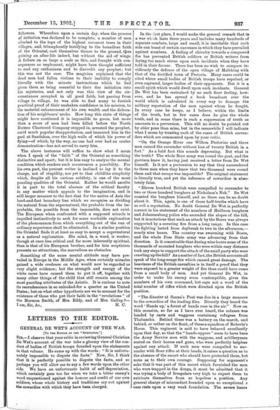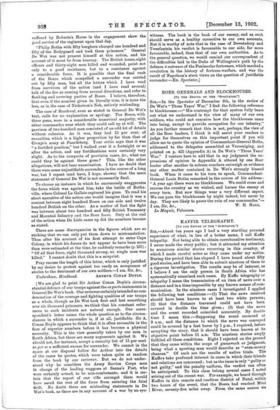LETTERS TO THE EDITOR.
GENERAL DE WET'S ACCOUNT OF THE WAR.
[To TIM EDITOR Of TRY " SPROILTOB..1
Si;a,—I observe that your critic in reviewing General Christian De Wet's account of the war take a gloomy view of the con- duct of bodies of British troops founded upon the statements in that volume. He sums up with the words : "It is unfortu- nately impossible to dispute the facts." Now,„Sir, I think that it is perfectly possible to dispute the facts, and so perhaps you will allow me to say a few words upon the other side. We have an unfortunate habit of self-depreciation, which certainly goes too far when we take a bitter enemy's word unquestioned against the honour and credit of our own soldiers, whose whole history and traditions cry out against the cowardice with which they have been charged.
In the first place, I would make the general remark that in a war which lasts three years and includes many hundreds of separate combats, large and small, it is inevitable that each side can boast of certain successes in which they have prevailed against numbers. A feeling of chivalry towards a conquered foe has prevented British soldiers or British writers from laying too much stress upon such incidents when they have told in their favour. There has been no wish to compare in- vidiously the defence of the open village of Mafeking with that of the fortified town of Pretoria. Many cases could be cited where small bodies of British troops have repulsed, or even captured, larger bodies of their opponents. But it is a small spirit which would dwell upon such incidents. General De Wet has been restrained by no such finer feeling, how- ever, and he has spread a book broadcast over the world which is calculated in every way to damage the military reputation of the men against whom he fought. In every ease he keeps, as I believe, within the limits of the truth, but in few cases does he give the whole truth, and in some there is such a suppression of truth as amounts to a perversion. This will no doubt be pointed out by abler pens than mine, but in the meanwhile I will indicate what I mean by treating each of the cases of British surren- ders which are commented upon by your critic.
"On the Orange River one Willem Pretorius and three men caused the surrender without loss of twenty British in a fort." As a bald fact this sounds depressing. But what is the truth? The whole Boer army was round the post, and the garrison knew it, having just received a letter from De Wet himself. Is it not a perversion to say that they surrendered to three men when they knew that two thousand were round them and that escape was impossible? The original statement is literally true, and yet the inference of cowardice is abso- lutely false.
"Eleven hundred British were compelled to surrender to two or three hundred burghers at Nicholson's Nek." De Wet counted the burghers himself, and so there can be no doubt about it. This, again, is one of those half-truths which have so evil a reputation. No doubt General De Wet is perfectly correct in his statement of the numbers of Heilbron burghers and Johannesburg police who ascended the slopes of the hill, but it is notorious that such an attack by the Boers was always supported by a covering fire from a long range. In this case- the fighting lasted from daybreak to two in the afternoon,— nearly nine hours. The country was swarming with Boers, and the whole Free State army was advancing from that direction. Is it conceivable that during nine hours none of the thousands of mounted burghers who were within easy distance took any steps to support the attack of the small party who were crawling up the hill? As a matter of fact, the British accounts all speak of the long-range fire which caused great damage. The heaviness of the British casualties is in itself a proof that they were exposed to a greater weight of fire than could have come from a small body of men. And yet General De Wet, in order to make his enemy seem contemptible, gives the numbers of his own command, but says not a word of the total number of rifles which were directed upon the British position.
"The disaster at Sauna's Post was due in a large measure to the cowardice of the leading files. Directly they heard the word Hands up,' a forest of hands rose in the air." Now on this occasion, so far as I have ever heard, the column was beaded by . carts and waggons containing refugees from Thabanchu. Behind these was a battery on the march, and behind, or rather on the flank, of these a squadron of Roberts's Horse. This regiment is said to have behaved excellently upon that day, so that the " hands-uppers " seem to have been the Army Service men with the waggons, and artillerymen seated on their horses and guns, who were perfectly helpless
against any attack. If such men were compelled to sur- render with Boer rifles at their heads, it raises a question as to the absence of the escort who should have protected them, but none as to their . own courage. Supposing for argument's sake that it was part of this escort which furnished the men who were trapped in the donga, it must be admitted that it was trying a. body of Irregulars very high to expect them to extricate themselves from so hopeless a position. Any general charge of misconduct founded upon so exceptional a case rests upon a very weak foundation. The severe losses
suffered by Roberts's Horse in the engagement show the good service of the regiment upon that day.
"Philip Botha with fifty burghers charged one hundred and fifty of the Bodyguard and took them prisoners." General De Wet was not present himself at this action, and his account of it must be from hearsay. The British losses, eight officers and thirty-eight men killed and wounded, point not only to a good resistance, but to a resistance against a considerable force. It is possible that the final rush of the Boers which compelled a surrender was carried out by fifty men, but all the letters which I have read from survivors of the action (and I have read several) talk of the fire as coming from several directions, and refer to flanking and covering parties of Boers. I believe, therefore, that even if the number given be literally true, it is none the less, as in the case of Nicholson's Nek, entirely misleading.
The case of Roodeva], even as stated in General De Wet's text, calls for no explanation or apology. The Boers, with three guns, were in a considerable numerical majority, with other commandos near which they could call up at will. The garrison of two hundred men consisted of an odd lot of details without cohesion. As it was, they had 15 per cent. of casualties, which is a higher proportion by far than that of Cronje's army at Paardeberg. Your critic says that it was "a fortified position," but I walked over it a fortnight or so after the action, and any fortifications were certainly very slight. As to the ramparts of provision cases, &c., what use could they be against three guns ? This, like the other allegations, will not bear examination. I have no doubt that there were some unjustifiable surrenders in the course of a long war, but I repeat (and have, I hope, shown) that the mere statement of General De Wet is not necessarily final.
To choose an instance in which he enormously exaggerates the force which was against him, take the battle of Botha- ville, where Colonel Le Gallais captured his guns. To read his short narrative of the action one would imagine that it was a contest between eight hundred Boers on one side and twelve hundred British on the other. As a matter of fact the fight was between about two hundred and fifty British Yeomanry and Mounted Infantry and the Boer force. Only at the end of the action when De Lisle came up did the numbers become as stated.
There are some discrepancies in the figures which are so striking that we can only put them down to mistranslation. Thus after his account of his first attempt to enter Cape Colony, in which his forces do not appear to have been more than were estimated at the time, he suddenly remarks (p. 237) : "Of all that force, eight thousand strong, no single man was killed." I cannot doubt that this is a misprint.
Pray excuse the length of this letter, which is only justified by my desire to protest against too ready an acceptance of stories to the detriment of our own soldiers.—I am, Sir, &c.,
[We are glad to print Sir Arthur Conan Doyle's circum- stantial defence of our troops against the ex parte statements in General De Wet's book. Our reviewer certainly intended no con- demnation of the courage and fighting qualities of our troops as a whole, though as De Wet took first and last something over six thousand prisoners, we think that his constant refer- ences to such incidents are natural enough. Our corre- spondent's letter raises the whole question as to the circum- stances in which a surrender is, if at all, justifiable. Sir A. Conan Doyle appears to think that it is often excusable in the face of superior numbers before it has become a physical necessity. This is the view generally taken by our men in South Africa, but there are many arguments against it. We should not, for instance, accept a casualty list of 15 per cent as per se a sufficient excuse for surrender. We cannot in the space at our disposal follow Sir Arthur into the details of the cases he quotes, which were taken quite at random from the book by our reviewer. But we do not under- stand why he considers the Army Servioe Corps men in charge of the leading waggons at Sauna's Post, who were certainly armed, to be non-combatants; and it is cer- tain that the report of one rifle amongst them would have saved the rest of the force from entering the fatal drift. No doubt there are misleading statements in De Wet's book, as there are in any account of a war by an eye- witness. The book is the book of our enemy, and aa such should serve as a healthy corrective to our own accounts. But it is worthy of note that in the case of Dewetsdorp and Tweefontein his verdict is favourable to our side, far more favourable, indeed, than that of our own authorities. As to the general question, we would remind our correspondent of the difficulties laid in the Duke of Wellington's path by the defence it outrance of the Peninsular fortresses, which marked a revolution in the history of fortress-warfare, and was the result of Napoleon's stern views on the question of justifiable surrender.—En. Spectator.]



















































 Previous page
Previous page